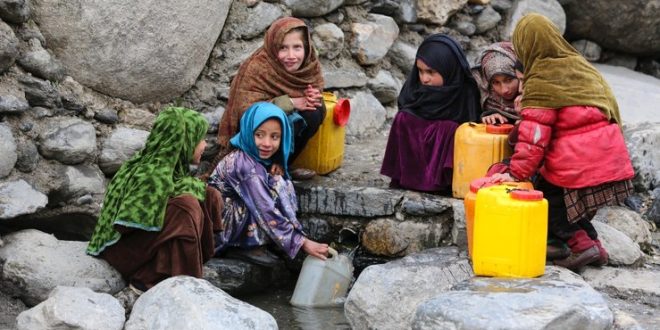AT Kabul: On this year’s World Water Day, as global attention turns to the importance of clean water access, the situation in Afghanistan remains dire. More than 33 million people—nearly 80 percent of the population—are facing severe water shortages, a crisis deepened by decades of conflict, erratic climate patterns, and crumbling infrastructure.
Shafiqullah Hamkar, a resident of Kabul’s District 5, has watched his borewell run dry over the past few years. “There is barely any snowfall or rain anymore,” he said, standing next to a now-defunct water pump. “The groundwater levels have dropped so much that we are left with no option but to buy water from private tankers. It’s a huge burden.”
Hamkar is not alone. Across Afghanistan, millions of families—particularly in rural areas—have resorted to untreated surface water, increasing the risk of cholera, diarrhea, and other waterborne diseases. The crisis extends far beyond drinking water; dwindling water supplies have left farmers unable to irrigate their crops, threatening food security in a country already grappling with one of the world’s worst humanitarian crises.
“For millions of Afghans who are already struggling with severe economic hardship, simply finding water for drinking, cooking, or farming has become an impossible task,” said Martin De Boer, the head of programs for the International Committee of the Red Cross (ICRC) in Afghanistan. “This not only affects public health but also devastates food production and hampers any potential for economic recovery.”
The lack of critical infrastructure, including modern water supply systems, dams, and irrigation networks, has exacerbated the crisis. With minimal investment in water management, many communities rely on outdated or broken hand pumps and wells that can no longer reach the diminishing water table.
Despite these challenges, some efforts are being made to mitigate the crisis. Over the past year, ICRC initiatives in cities like Kabul, Herat, Kandahar, Kunduz, and Khost have provided improved access to clean water for more than 1.12 million people. In rural regions such as Kunduz, Paktia, and Parwan, the repair of over 1,300 hand pumps and the installation of nearly 1,900 bio-sand filters—simple but effective filtration systems—have allowed 275,000 people to access clean drinking water.
In Parwan Province, the Afghan Red Crescent Society, in partnership with the ICRC, has distributed water filters and launched hygiene awareness programs across 26 villages. The initiative has benefited more than 17,000 people, helping to reduce waterborne diseases and improve overall public health.
Yet, these efforts remain a drop in the ocean compared to the scale of the crisis. As Afghanistan faces another year of climate uncertainty, aid groups warn that without significant investment in water infrastructure, the country’s water crisis could worsen, with catastrophic consequences for millions already on the brink.
 Afghanistan Times
Afghanistan Times




